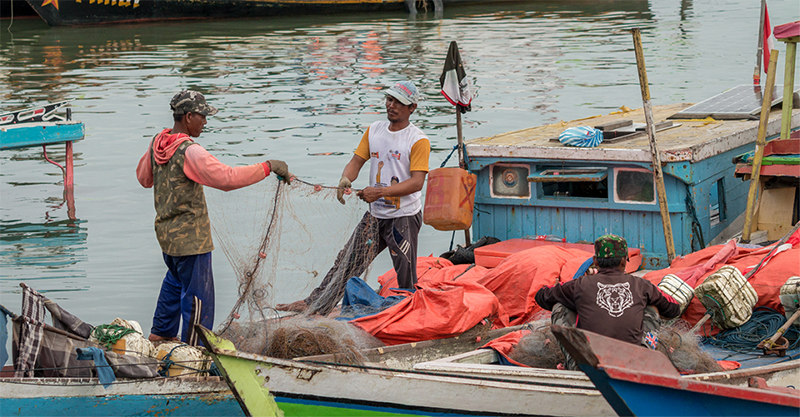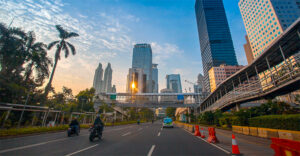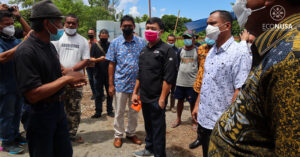
Most areas in Indonesian archipelago stretching from Sabang to Merauke consist of water. Based the data of Maritime and Fisheries Ministry, the total areas of Indonesia are 8.3 million square kilometers. The total expanse of water is 6.4 million square kilometers with 108,000 square kilometers coastal lines on around 17,054 islands. With the vastness of water, the country and particularly coastal communities should have got abundant benefits from the sea.
Regrettable, the mindsets of businesspeople and bureaucrats, particularly those plawing with maritime and fisheries, have thus far focused merely on extractive and exploitative direction without having serious concerns with the protection of the existing ocean natural resources. The statement was made by Susi Pudjiastuti, the former Ministry of Maritime and Fisheries, on a webinar entitled “Challenge for Indonesia to Curb Illegal Fishing” organized by Kumparan on June 12, 2020.
“Old generations tend to only think about extraction and exploitation. Whereas, fisheries are deemed renewable resources which will be more productive when we care about them. The more we let go, the more breeding there will be. The old generations think that they would greedily catch as much as possible when there are ample stocks of fish. The protection, the more productivity there will be. You will get more money if you protect resources,” said Susi.
Ocean is the source of life with tourism potentials and high values of nutritious and economy food stocks. However, the benefit of ocean is far more valuable than those mere reasons to the peoples in Indonesia. Maritime and fisheries sector supports the state economy from revenues generated from fisheries industry, taxes from vessels, particularly the foreign-flagged vessels operating in the Indonesian sea, including fish boats.
Maritime in Indonesia has to cope with various challenges. In addition to the exploitative mindsets of the old generations, Indonesia’s maritime and fisheries should put up some issues on how to curb the escalating practices of Illegal, Unreported, and Unregulated Fishing (IUUF). Indonesia has 3 million square kilometers Economic Exclusive Zone (EEZ) which put it on the 7th rank with the largest EEZ in the world as from the total of 3.25 million square kilometers of Indonesian water. As to Susi, such a condition has made IUUF criminals consider that Indonesia is the main prey to steal sea products. Worse still, the major international cartels have power over the Indonesian ocean.
The IUUF practice has made the world suffer from USD 10 to 23.5 billion in losses annually. With the Covid-19 pandemic, the amount of losses increased up to USD 15.5-36.4 billion. In Indonesia alone, IUUF practice has led to USD 4 billion state losses annually. As to Susi, the figures here could even be twofold higher than the official data.
In the World Ocean Conference 2018, the United Nations have targeted to free the world from IUUF practices by 2020. This target should have served as strong cautioning remark to stay alert. Indonesia is to be one of the lucrative targets of the IUUF perpetrators by acquiring legalized registration for their vessels’ activities on Indonesian water with illegal practices.
Talking about IUUF practices does not simply deal with fish thievery. In fact, there are unscrupulous practices of ship crews slavery, human trafficking, trade of protected fauna and illegal oil trading. All of this unlawfulness is resorted amidst the ocean.
“They also steal turtles, birds, crocodile skins and other goods from Indonesia. They bring with them illegal goods to trade in the ocean. Economically speaking, this is very dangerous,” asserted Susi.
According to the Chief of Indonesia Maritime Security Agency (Bakamla), Vice Admiral Aan Kurnia, the threats of IUUF in Indonesia dealing with registration of illegal boats are factual. The IUUF-related crimes here include slavery, overfishing, ecological destruction, money laundering, smuggling, and sea conflict. The IUUF unlawfulness happens in Indonesia, according to Arif Satria, the Rector of Bogor Agriculture University (IPB), commonly includes documents forgery, transshipment on open sea, absence of permit document, permit violation, and multiple flags. Susi added that on the ground once it was found that a boat could have more than 20 different flags to deceive patrol officers.
Observing the pattern of illegal fishing committed by foreign vessels in 2015-2019, the CEO of Indonesian Ocean Justice Initiative (IOJI), Mas Achmad Santosa, elaborated that there are 6 regions prone to illegal fishing in Indonesia. Those are Indian Ocean on the western Sumatera, namely North Natuna Sea (South China Sea), Natuna Sea, and Karimata Strait (on the overlapping areas which are in conflict against Viet Nam) and Tolo Bay and Banda Sea. In the eastern Indonesia, the IUUF-prone waters are on Cenderawasih Bay and Pacific Ocean, Sulawesi water and northern Halmahera Island, Aru Sea, Arafura Sea and eastern Timor Sea.
“The foreign-flagged vessels usually move slowly under 3 knot speed. Such slow movement indicates an IUUF on our EEZ regions,” said Mas Achmad.
He added that with such an indication, the Indonesian water badly needs the presence of routine patrol from the Maritime and Fisheries Ministry, Maritime Security Agency and Indonesian Navy. Meanwhile, Susi explained that strong leadership and rigid policy from the government will diminish the opportunity for IUUF perpetrators to commit illegalities in Indonesian sea that causes state losses.
Following the enactment of moratorium for foreign ship permit in 2014, Mas Achmad said that the survey results show the mounting productivity of Indonesian ships under 100 gross tonnage in 12 ports in Indonesia. In Sorong, Papua, the productivity increased by 56% and in Ambon, Maluku rose by 48%. It implies that it requires rigid policy form the government to secure Indonesian sea which will prevent criminals to commit illegal fishing. Hence, the Indonesian fishermen can enjoy sea products from their own water. It is the government’s duties to protect small fishermen and encourage the major ones to be more productive.
Susi also reminded that the results from the enactment of moratorium for foreign-flagged ship permit in 2014 would be to no avail if the government fails to continue it with rigid policy to safeguard the Indonesian water. Unfortunately, the revision of the Maritime and Fisheries Ministerial Regulation on the Fish Catch Business and Productivity of Fish Boat allows large-sized fishing vessels to use trawl-nets and cantrang (seine net) as tools which are not deemed eco-friendly to catch fish. This will serve as the entry point for the looming threats to Indonesian sea. It also destroys sea ecosystem and crumples the small fishermen due to the less catches with the rampant practices of illegal fishing. The absence of government’s rigid policy makes the future of Indonesian sea in serious jeopardy.
“Sea is very vital to Indonesia. Fish is the source of protein to children of the nation due to its affordability. Fish is important to create competitive human resources if compared to the neighboring country. The leaders and politicians should consider that we have millions of peoples that need protein and the cheapest one is fish,” said Susi.
Editor: Leo Wahyudi







